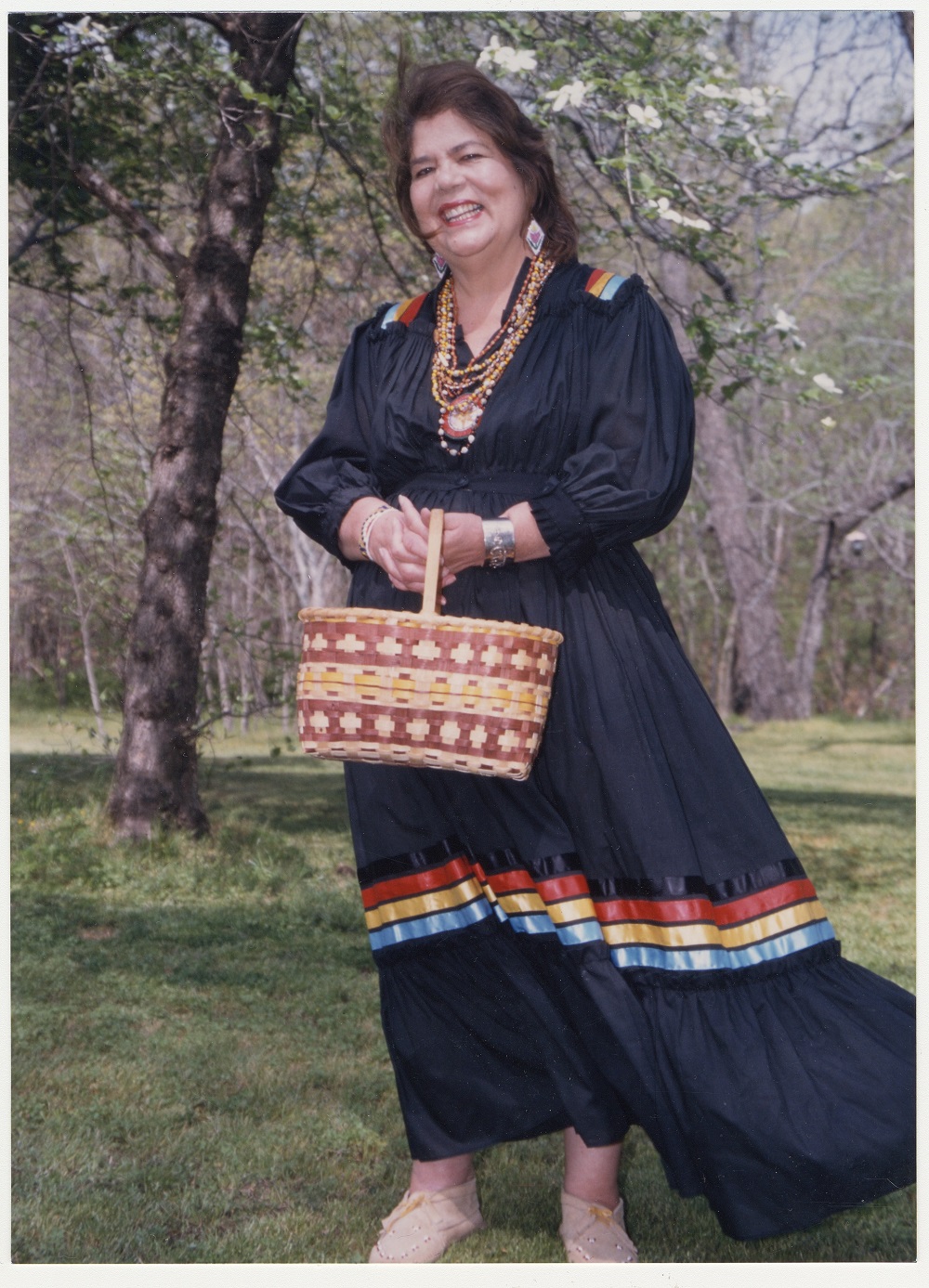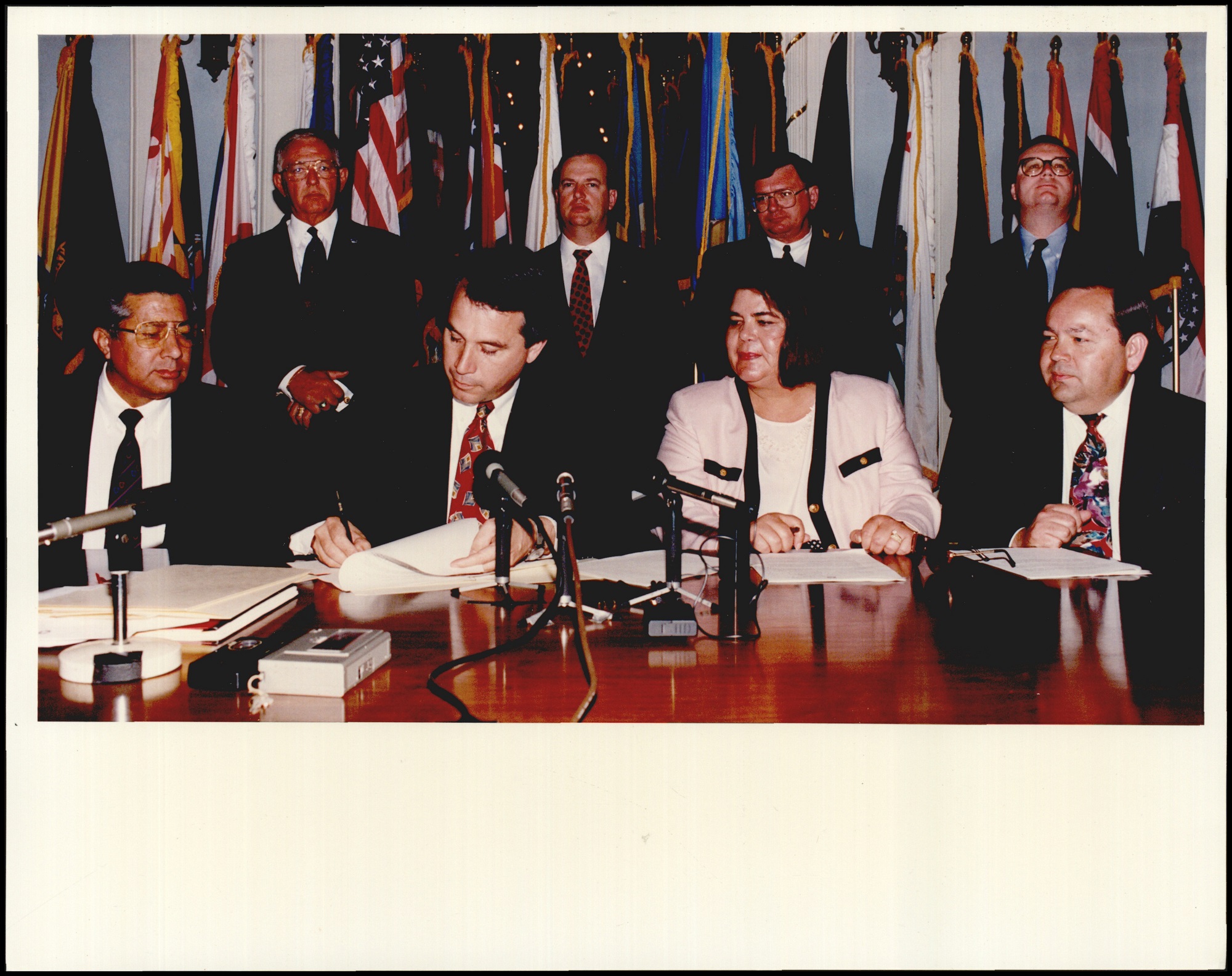Wilma Mankiller
Charlie L. Soap, photographer. Wilma Mankiller, full-length portrait / Charlie L. Soap. Photograph. Retrieved from the Library of Congress, <www.loc.gov/item/2006686215/>.
Choctaw Chief Hollis Roberts, and Gov. David Walters, Cherokee Principal Chief, Wilma Mankiller, Chickasaw Gov. Bill Anoatubby
Jim Beckel, “Choctaw Chief Hollis Roberts, and Gov. David Walters, Cherokee Principal Chief, Wilma Mankiller, Chickasaw Gov. Bill Anoatubby,” Oklahoma Publishing Company, 1992. Oklahoma Historical Society.
This video was created by the New-York Historical Society Teen Leaders in collaboration with the Untold project.
Wilma Pearl Mankiller was born on November 18, 1945, at the W. W. Hastings Indian Hospital in Tahlequah, Oklahoma, the capital of the Cherokee Nation. Her father was Cherokee, and her mother was a white woman. Wilma had five older and five younger siblings. Their family name Mankiller was traditionally a title given to brave Indigenous warriors who had been responsible for protecting the tribe.
The family moved to San Francisco when Wilma was 11 years old. Thanks to the Indian Relocation Act of 1956, their moving expenses were covered by the U.S. government and they were eligible for job training. The government promoted the program as a great opportunity for Indigenous communities. In reality, the goal was to Americanize Indigenous families, loosen their ties to their culture, and weaken the political power of tribes on reservations. Wilma described the move as “my own Trail of Tears.”
Wilma did not like living in a big city. Using money she made from babysitting, she bought a bus ticket and fled to her maternal grandparents’ ranch in Riverbank, California. Her dad picked her up and brought her back to San Francisco that same day. But Wilma was determined. After five trips to Riverbank, her parents decided to let her stay with her grandparents.
After a year on the ranch, Wilma felt ready to return to San Francisco. She soon discovered the Indian Center of San Francisco, usually called “The Center.” It was a place where Indigenous people from different tribes could access assistance and enjoy recreation activities. The Center allowed Wilma to reconnect with her community, and she quickly called it her home.
Wilma enrolled in classes at San Francisco State College, where she met Hector Hugo Olaya de Bardi, a fellow student who was originally from Ecuador. They fell in love and married in 1963. Wilma gave birth to their first daughter, Felicia, a year later. When their second daughter, Gina, was born in 1965, she became a stay-at-home mother. She enjoyed taking care of her family, but also felt that she was on the sidelines of the activism around her in the Bay Area during the 1960s.
On November 20, 1969, a group of 89 Indigenous activists, including women and children, occupied Alcatraz Island. The island near San Francisco had been a notorious prison. The goal of the group was to raise awareness of the American government’s treatment of Indigenous people.
Wilma wanted to join the activists on Alcatraz, but her husband told her to stay at home with the children. He did not understand how important the protest was to her. So she got involved in another way, raising money to support the occupiers.
After nineteen months, the Alcatraz Occupation ended on June 11, 1971. Most of the demands of the protestors were not met, but it generated significant momentum for the movement for Indigenous rights. For Wilma, the event changed her life forever. She wanted to make a difference for her people.
Wilma returned to college and spent more time volunteering at The Center. It gave her a sense of purpose, but her husband did not understand why she was not happy staying at home. Hugo and Wilma divorced in 1974. She decided to return to Oklahoma with her two daughters.
She found employment with the Cherokee Nation in 1977. Her primary responsibility was to enroll Indigenous people in college programs for environmental sciences and health care. The goal of this program was for the students to take this knowledge back to their communities. She eventually returned to college and completed her degree in 1979, then enrolled in a graduate program in community planning at the University of Arkansas.
In 1981, Wilma helped found the Cherokee Nation Community Development Department. The organization’s goal was to start renewal projects in Cherokee communities. She was named as its first director. Her first project was to provide running water and new housing to the town of Bell, Oklahoma, which was 95% Cherokee.
“Prior to my election, young Cherokee girls would never have thought that they might grow up and become chief.”
Wilma met Charlie Lee Soap working together on the project in Bell. He was Cherokee and taught her about traditional medicine practices. Wilma and Charlie married in 1986.
Since the 1970s, the Cherokee Nation has directly elected its chiefs. When Chief Ross Swimmer ran for reelection in 1983, he asked Wilma to run as his deputy chief, a position similar to the vice presidency.
Many voters did not respond favorably to the idea of a woman as deputy chief. Wilma even received hate mail and death threats. But she continued her campaign and won, becoming the first woman to serve as deputy chief of the Cherokee Nation. In her new position, Wilma committed herself to improving the living conditions and opportunities of the Cherokee people, particularly those in rural communities.
In 1985, President Ronald Reagan nominated Chief Ron Swimmer to lead the Bureau of Indian Affairs. According to the Cherokee Nation Constitution, his seat would be filled by the deputy chief. On December 5, 1985, Wilma was sworn in as the first woman chief of the Cherokee Nation.
As chief, Wilma led her community of 140,000 members of the Cherokee tribe. She was responsible for managing the tribe’s budget of $75 million. Under her leadership, she doubled revenues for the Cherokee Nation. She also expanded efforts to enroll more eligible members in the Cherokee Nation and membership tripled by the end of her tenure. With the additional income she generated, Wilma opened three health centers and a center to prevent drug abuse. She also expanded educational programs for young children to prepare them for kindergarten.
Her hard work as deputy chief and chief convinced many people that a woman could be a successful tribal leader after all. She overwhelmingly won reelection in 1987.
In 1989, Wilma’s health started to deteriorate. She received a kidney transplant, donated by her older brother, the following year. Despite her health issues, Wilma was determined to continue serving her people and decided to run for another term. She once again easily won reelection in 1991.
Wilma accomplished much for the Cherokee people during her time as chief. Her focus was primarily on improving infrastructure and educational opportunities. She also wanted to ensure that Cherokee culture would be preserved in the future by implementing Cherokee language programs in schools.
Toward the end of her third term as chief, Wilma made the difficult decision to not run again in the 1995 election. Her poor health made the work too challenging for her to keep up. She accepted a teaching position at Dartmouth University in New Hampshire.
In January 1998, President Bill Clinton awarded Wilma the Presidential Medal of Freedom, the country’s highest civilian honor. Despite her continued health struggles, she traveled the country to deliver speeches on her achievements and in favor of Indigenous rights. Wilma Mankiller passed away from cancer on April 6, 2010.
Vocabulary
- Cherokee: One of the original Native nations that lived in the American Southeast. Today the Cherokee have reservations in Oklahoma and North Carolina.
- Trail of Tears: A series of forced displacements of Indigenous communities by the federal government from the southeastern United States to current-day Oklahoma. An estimated 100,000 people were forced to make the dangerous journey, of whom an estimated 15,000 did not survive.
- United States Bureau of Indian Affairs: An agency of the federal government that oversees all issues related to the Indigenous community.
Discussion Questions
- What inspired Wilma Mankiller to become a leader in the Cherokee Nation?
- How did Wilma Mankiller live up to being a protector of her people of the Cherokee Nation?
- What does her story say about the American government’s treatment of Indigenous people?
Suggested Activities
- Pair this life story with the life stories of Patricia Locke and Grace Thorpe. How did these three women stand up for their Indigenous communities?
- For a broader lesson on Indigenous activism in the 20th century, combine this resource with the occupation of Alcatraz, Women of All Red Nations (WARN), and the life stories of Patricia Locke and Grace Thorpe.
- Consider the challenges faced by women who broke into previously all-male positions by combining this life story with Geraldine Ferraro’s acceptance speech and the life stories of Sandra Day O’Connor and Ellen Ochoa.
- For a broader lesson on women of color and activism in this period, pair this life story with materials by Latina environmental activists and the life stories of Patricia Locke and Yuri Kochiyama.
Themes
ACTIVISM AND SOCIAL CHANGE; AMERICAN IDENTITY AND CITIZENSHIP; POWER AND POLITICS









